Hi there, fellow dog lover! I’m Dr. Candy, your friendly holistic veterinarian. Today, we’re going to talk about a topic that’s often overlooked but incredibly important for our furry friends’ overall health – dental hygiene. Specifically, we’re focusing on Bluetick Coonhound Dental Health.
Bluetick Coonhounds, with their lovable personalities and striking appearance, are a joy to have around. But, like any breed, they have specific health needs, including dental care. Did you know that dental diseases can lead to serious health complications if left untreated? It’s not just about fresh breath and clean teeth; it’s about ensuring our pets live a healthy, happy life.
From recognizing the signs of dental disease to exploring conventional and holistic treatments, we’ll cover everything you need to know about Bluetick Coonhound oral care. So, let’s dive in and learn how to keep those doggy smiles bright and healthy!
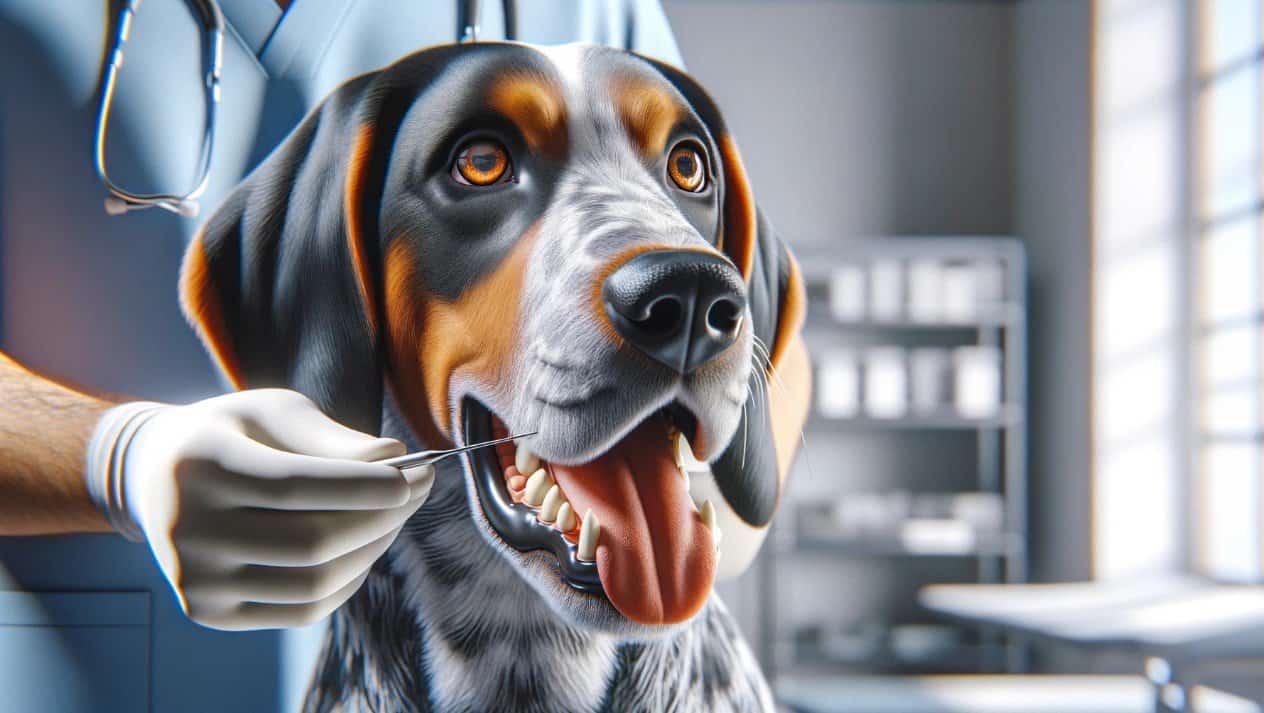
Signs of Dental Disease in Bluetick Coonhound
Just like us, our four-legged friends can also suffer from oral health issues. Understanding the signs of dental disease in your Bluetick Coonhound is essential for maintaining their overall health. Let’s explore together the common symptoms that could indicate your dog is struggling with dental disease.
One of the first signs of dental disease in a Bluetick Coonhound, or any other breed for that matter, is bad breath. While it’s normal for our canine companions to not have the freshest breath, a particularly foul or unusual odor could be an indication of underlying dental issues.
Another common symptom is a change in eating habits. If your Bluetick Coonhound is suddenly reluctant to eat, or is showing signs of discomfort while eating, this could be due to dental pain. They might chew on one side of their mouth, drop food, or refuse to eat hard foods.
- Excessive drooling is another sign to watch out for. While some drooling is normal, especially for certain breeds, a sudden increase in drool could be a sign of dental disease.
- Discolored or loose teeth are also not a good sign. Healthy dog teeth should be white or just slightly yellow. Any brown or black coloration, or teeth that are loose or missing, are definite red flags.
- Lastly, look for any swelling in the mouth or face. This could be a sign of an abscessed tooth or other serious dental issue.
Remember, dogs are experts at hiding pain. So, even if your Bluetick Coonhound isn’t showing obvious signs of discomfort, they could still be suffering from dental disease. Regular check-ups with your vet are crucial, but also take the time to examine your dog’s mouth at home. Look for any changes or symptoms that could indicate a problem. If you spot anything unusual, it’s always best to consult with your vet.
Together, we can ensure your Bluetick Coonhound’s dental health is in top shape. After all, a healthy mouth is a key part of a happy, healthy dog!
Common Dental Health Issues In Bluetick Coonhound
As a veterinarian, I often encounter a variety of dental health issues in Bluetick Coonhound. This breed is prone to certain oral health problems, and understanding these can help you maintain your dog’s dental health effectively.
- Periodontal Disease: This is a common issue in many dog breeds, including Bluetick Coonhounds. It’s an infection of the tissues surrounding the teeth and can lead to tooth loss if not treated promptly.
- Gingivitis: This inflammation of the gums is often a precursor to periodontal disease. Regular teeth cleaning can prevent gingivitis and subsequent dental issues.
- Bad Breath: While it might seem like a minor issue, persistent bad breath can indicate underlying dental problems in your Bluetick Coonhound. It’s essential to address this issue to maintain overall Bluetick Coonhound dental health.
- Broken Teeth: Bluetick Coonhounds love to chew, which can sometimes lead to broken teeth. This can be painful and can cause further dental complications if not addressed.
Prevention is always better than cure when it comes to Bluetick Coonhound dental health. Regular teeth cleaning, a healthy diet, and dental check-ups can help keep your dog’s mouth healthy. Remember, a healthy mouth contributes significantly to your Bluetick Coonhound’s overall health and happiness.

Keeping your Bluetick Coonhound’s teeth clean and healthy is vital for their overall well-being. While brushing their teeth and providing them with dental chews can help, sometimes, more comprehensive care is needed. Let’s discuss the conventional dental health treatments available for your furry friend.
Anesthetic Dental Cleanings
Anesthetic dental cleanings are a common treatment for dogs suffering from dental diseases. This procedure involves putting your Bluetick Coonhound under general anesthesia so that a thorough cleaning can be performed. This includes scaling to remove tartar and plaque, polishing to smooth the tooth surface, and a fluoride treatment to strengthen the teeth. While under anesthesia, a thorough oral examination can also be conducted to identify any hidden issues such as gum disease or tooth decay.
Potential Individual Health Obstacles
However, it’s important to note that not all dogs are suitable candidates for anesthetic dental cleanings. Certain health conditions can pose a risk. For example, heart problems can make anesthesia risky, as it can put extra stress on the heart. Similarly, dogs with drug sensitivities may experience adverse reactions to the anesthesia. Seizures can also be triggered by certain anesthetic drugs, making this procedure potentially dangerous for dogs with a history of seizures.
Older Bluetick Coonhounds, because of their extreme age, might be at a higher risk during anesthetic procedures. Their bodies might not process the anesthesia as efficiently, leading to complications. Before any dental procedure involving anesthesia, your vet will conduct a thorough assessment to determine whether your Bluetick Coonhound is a suitable candidate.
Remember, maintaining your Bluetick Coonhound’s dental health is crucial to prevent dental diseases and other related health issues. Regular check-ups and cleanings, combined with a good oral hygiene routine at home, can keep your pup’s teeth in top shape. However, always consult with your vet before making any decisions regarding your dog’s health.
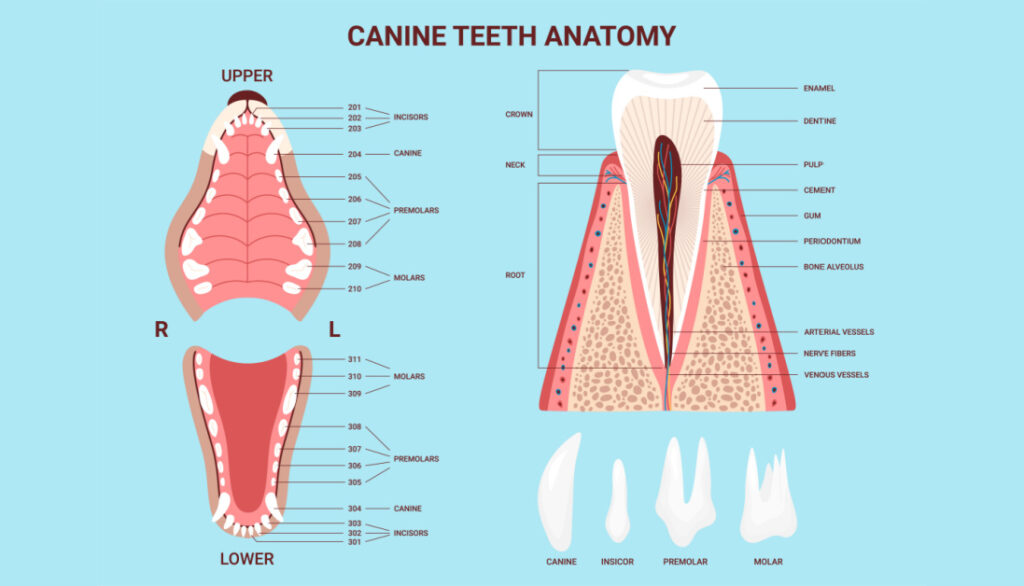
When it comes to Bluetick Coonhound Dental Health, it’s not just about regular cleanings and check-ups. A holistic approach can do wonders, and that’s what Dr. Candy recommends. This approach focuses on a balanced diet and the use of oral health specific probiotics. Let’s dive into the details.
Diet: Low Carbs, Avoid Added Sugars, Enzymes In Fresh Food
Firstly, let’s talk about diet. What your Bluetick Coonhound eats has a significant impact on their dental health. A diet low in carbs is beneficial because carbohydrates can stick to your dog’s teeth, leading to plaque build-up and eventually dental disease.
It’s also crucial to avoid added sugars. Just like in humans, sugar can cause tooth decay in dogs. Instead, focus on providing your Bluetick Coonhound with fresh foods that are rich in enzymes. These enzymes can help break down plaque and keep your dog’s teeth clean. Foods like raw carrots, apples, and celery are excellent choices.
Oral Health Specific Probiotics
Next up are probiotics – but not just any probiotics. Dr. Candy recommends oral health specific probiotics that are specially designed to support dental health in dogs. These probiotics work by crowding out harmful bacteria in the mouth, reducing plaque and tartar build-up.
One such product is Probiora for Dogs. This oral health targeted probiotic can be easily added to your dog’s food or water, making it a hassle-free addition to their dental care routine. You can find Probiora for Dogs here: https://amzn.to/3ShKkIN.
Remember, while these steps can significantly improve your Bluetick Coonhound’s dental health, they don’t replace regular dental check-ups and cleanings. Always consult with your vet for a comprehensive dental care plan for your furry friend.

As a loving dog parent, you may have been drawn to the promises of commercially promoted dental chews. However, it’s essential to note that many of these products fall short of delivering on their pledges. Not only do they often fail to clean your Bluetick Coonhound’s teeth effectively, but they can also contain ingredients that are harmful to your pup’s overall health. Many are loaded with artificial flavors, preservatives, and even sugars, which can lead to obesity and other health issues over time.
Drinking water additives, another commonly marketed dental health product, can also be harmful. They may kill off the beneficial bacteria in your dog’s gut, disrupting the balance of their microbiome and potentially leading to digestive issues.
As a responsible pet parent, you might be wondering, “What can I use to maintain my Bluetick Coonhound’s dental health?” Don’t worry, I’ve got you covered. Let’s explore some of Dr. Candy’s recommended dental chews and products.
Dr. Candy’s Recommended Dental Chews & Products
As a dog parent, you may have come across commercially promoted dental chews that promise to maintain your Bluetick Coonhound’s dental health. Unfortunately, many of these products don’t live up to their promises. They are often loaded with artificial ingredients and fillers, which do little to clean your dog’s teeth and can even contribute to dental issues. Moreover, some products like drinking water additives may harm the beneficial bacteria in your dog’s gut, further compromising their overall health.
So, what’s the alternative? The answer lies in natural, single source proteins, which are not only healthy but also effective in maintaining your dog’s dental health. Here are some of Dr. Candy’s recommended dental chews and products:
Tendons
Tendons are a fantastic natural chew for your Bluetick Coonhound. They are tough and fibrous, which helps to scrape off plaque and tartar from your dog’s teeth. Plus, they are a good source of protein and collagen, promoting good joint health.
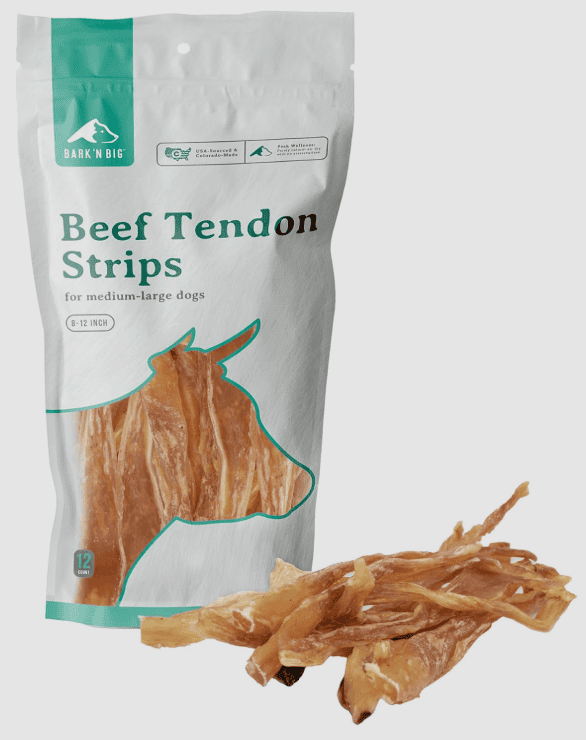
Raw Marrow Bones
Raw marrow bones are another excellent choice for maintaining your dog’s dental health. They are a natural source of calcium and phosphorus, which are essential for healthy teeth and bones. Furthermore, the act of gnawing on bones can help to clean your dog’s teeth and gums.
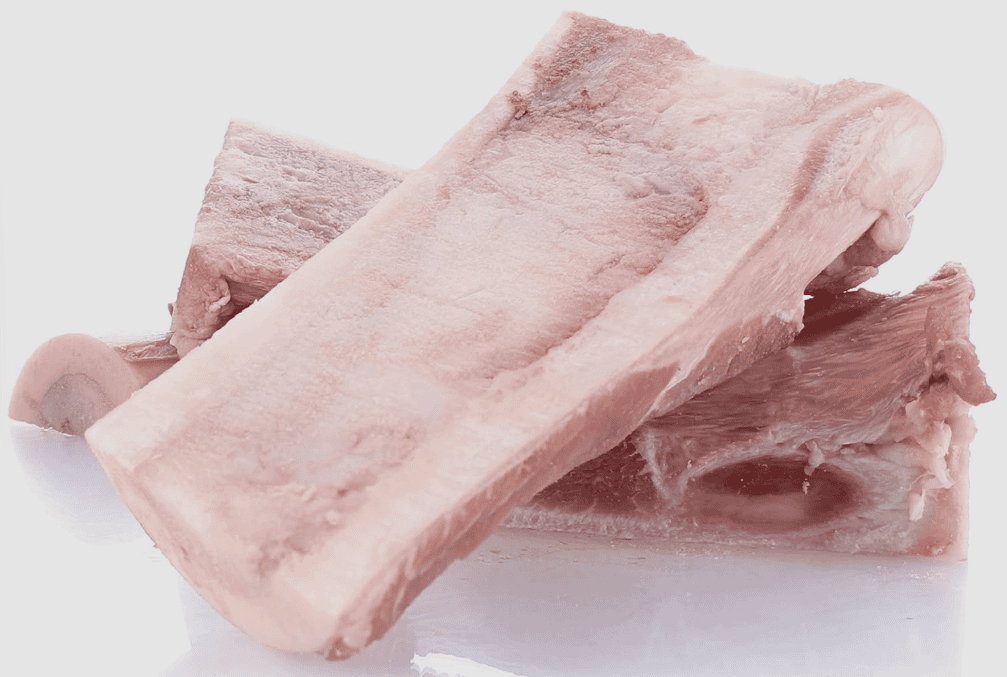
Bully Sticks
Bully sticks are made from 100% beef muscle, providing a natural and digestible chew for your dog. They can effectively remove plaque and tartar and are a good source of protein. However, always supervise your dog while they’re chewing on a bully stick to prevent any choking hazard.
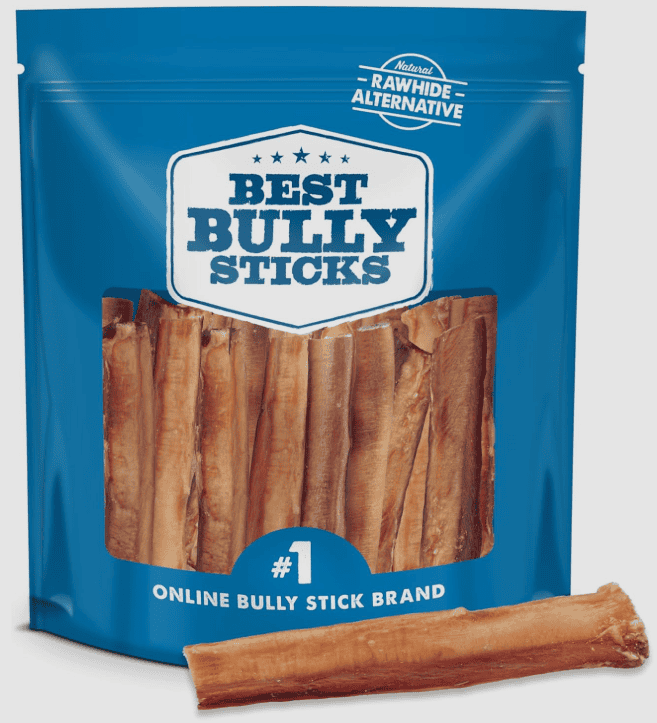
Remember, while these dental chews and products can help maintain your Bluetick Coonhound’s dental health, they should not replace regular check-ups with a vet. Regular professional cleanings are essential to prevent dental diseases and ensure your dog’s overall health.
Frequently Asked Questions
1. How can I prevent bad breath in my Bluetick Coonhound?
Regular brushing of your Bluetick Coonhound’s teeth with a dog-specific toothbrush and toothpaste can help prevent bad breath. Additionally, providing dental chews or toys designed to promote oral health can also be beneficial.
2. What are some signs of dental issues in Bluetick Coonhounds?
Signs of dental issues in Bluetick Coonhounds may include bad breath, swollen or bleeding gums, yellow or brown tartar buildup on the teeth, difficulty eating, pawing at the mouth, or a sudden change in chewing habits.
3. Can I use human toothpaste to brush my Bluetick Coonhound’s teeth?
No, it is not recommended to use human toothpaste for your Bluetick Coonhound. Human toothpaste contains ingredients that can be harmful if ingested by dogs. Always use toothpaste specifically formulated for dogs.
4. How often should I schedule professional dental cleanings for my Bluetick Coonhound?
It is generally recommended to schedule professional dental cleanings for your Bluetick Coonhound at least once a year. However, the frequency may vary depending on your dog’s individual dental health and the advice of your veterinarian.
5. Are there any natural remedies for bad breath in Bluetick Coonhounds?
While there are some natural remedies that may help freshen your Bluetick Coonhound’s breath, such as adding parsley to their diet or using coconut oil as a mouth rinse, it is important to consult with your veterinarian before trying any new remedies.
